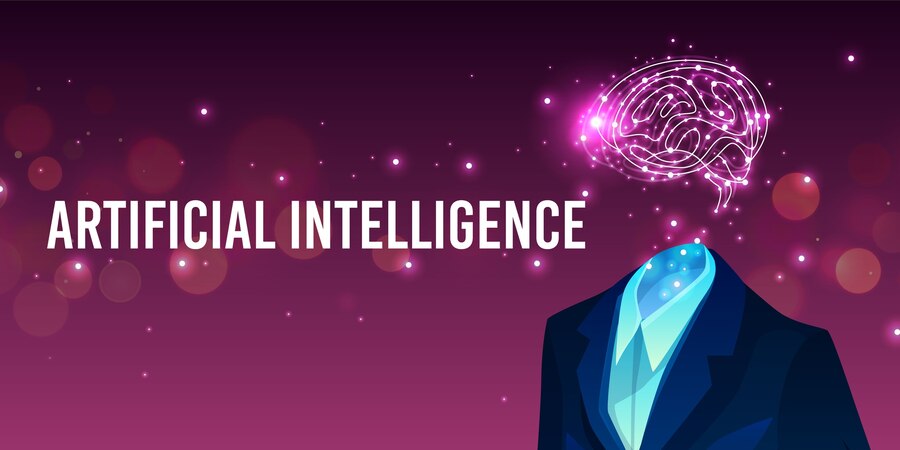Over the past ten years, artificial intelligence (AI) has quickly progressed from a theoretical idea to a useful instrument that is already revolutionizing numerous industries.
However, AI has not yet reached its full potential. What will be the future ai trends 2025?
Developments in the upcoming years will offer one of the biggest economic possibilities of our time, with the potential to boost the GDP by $4.4 trillion annually.
However, there are risks and obstacles ahead, just like with every latest ai technology.
We’ll look at seven major trends influencing future of ai in this report.
The development and future of artificial intelligence and the latest ai technology
Over the next ten or so years, the AI market is expected to grow* by more than thirteen times.
In recent years, the latest ai technology has improved significantly, moving from simple automation to sophisticated systems with powerful machine learning, natural language processing, and predictive analysis capabilities. Research suggests that as businesses work to incorporate AI into their core operations, industries like healthcare, banking, retail, and logistics will see even more accuracy and efficiency in 2025.
When adopting the latest ai technology
, businesses already experience huge benefits, such as a 66%** increase in labor throughput. This expansion signifies a time when artificial intelligence (AI) will play a crucial role in decision-making, predictive maintenance, customized client experiences, and more.
Extremely customized client experiences
The way businesses handle customer service will be revolutionized by AI’s capacity to assess user preferences. Businesses will utilize artificial intelligence (AI) to forecast client demands in real time by 2025, providing personalized service and product recommendations that boost customer satisfaction. This trend enables businesses to increase revenue sources while forging closer bonds with their customers.
AI-driven decision-making and automation
Although automation has long been a feature of AI, its effects will be significantly more noticeable in 2025. By offering predictive insights that can spot opportunities and reduce risks, AI technologies will help executives make decisions. These technologies, which are enhanced by machine learning algorithms, will assist CEOs in making more accurate, data-driven decisions more quickly.As AI develops, a few significant trends emerge as being essential to further developments:
AI-driven decision-making and automation
Although automation has long been a feature of AI, its effects will be significantly more noticeable in 2025. By offering predictive insights that can spot opportunities and reduce risks, latest ai technology will help executives make decisions. These technologies, which are enhanced by machine learning algorithms, will assist CEOs in making more accurate, data-driven decisions more quickly.
Transparency and ethical AI
Transparency and accountability are two ethical issues that have attracted attention due to AI’s quick adoption. Businesses must give ethical AI use top priority by 2025 in order to win over customers and stay clear of any legal issues. Anticipate guidelines and regulations controlling the application of AI, guaranteeing adherence to new standards and safeguarding customer information.
AI integration for teamwork in the workplace
AI will transform collaboration by incorporating it into platforms and communication tools to optimize processes. AI systems will, for example, automate reporting, monitor project progress, and even foresee possible obstacles, all of which will increase productivity.
AI-powered, improved virtual collaboration tools will allow team members to engage with each other without interruption, no matter where they are in the world. Businesses can get a competitive advantage by leveraging the future of ai and AI trends for 2025.
Developments in natural language processing (NLP)
AI will be able to comprehend and react to human language with astonishing accuracy by 2025, thanks to natural language processing. Improvements in NLP will result in better voice assistants, chatbots, and AI-driven analytics that can better understand unstructured data. Both customer service and executives’ capacity to track business sentiment will be improved by this trend.
Operational effectiveness and predictive maintenance
Predictive maintenance will increase rapidly, particularly in manufacturing and logistics. Organizations will save time and money by using AI to predict equipment problems before they happen, increasing overall operational efficiency. Predictive AI will give companies a competitive edge by 2025 by cutting maintenance expenses and downtime.
Cybersecurity solutions powered by AI
AI-powered security solutions will be essential for protecting digital assets as cyber attacks become more complex. In addition to identifying any security risks, AI will react to them instantly. This proactive strategy will protect private data and assist businesses in preventing expensive data breaches.
AI in medical diagnosis
AI’s promise in healthcare, especially in diagnostics, will only grow. AI apps will help physicians make accurate diagnoses, detect illnesses early, and even recommend treatment courses. This movement has the ability to completely transform healthcare by increasing its efficiency and accessibility.
Improved insights and data analytics
As AI systems get better at deciphering complicated data sets, data analysis will go to new heights. Executives will have access to unmatched insights into customer behavior, market trends, and company performance by 2025 thanks to AI-driven analytics. Leaders will be empowered by this trend to make wise choices that lead to success.
Bottom line
Without a doubt, the future of ai in 2025 will change how businesses function, improving everything from operational effectiveness to customer experiences. Leaders who understand the possibilities of these developments might use AI to revolutionize their companies. To meet the needs of a technologically evolved environment and generate growth, corporate executives can leverage AI by investing in advanced learning programs and remaining educated.
As AI develops further, visionary executives will make sure their companies are not only ready to adjust but also thrive in an AI-driven environment. Adopt these trends, arm yourself with the information you need, and set up your company for success in the future of ai.
Did you like our blogs associated with the future of ai and the latest ai technology? If not, you can leave a comment for us; we loved to pay attention. Feel free to share on Twitter or Facebook by way of using the remarkable-clean share buttons on the right!


